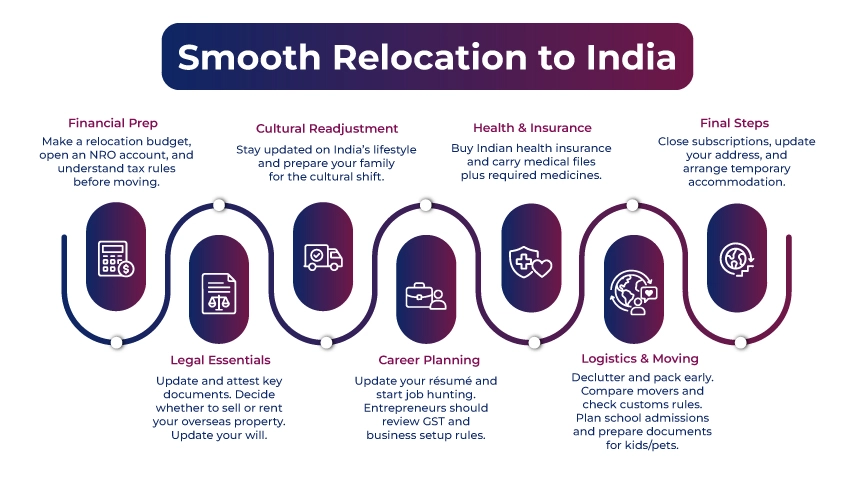Returning to your homeland after spending years abroad is a surreal feeling. However, the challenges this journey presents are real. As a non-resident Indian (NRI) planning to move back, you are in for a lot of planning and preparation. From legal considerations to financial preparations, career, logistical planning, and so on, there are a lot of things you have to figure out.
This guide brings you a smooth relocation back to India plan. Roll up your sleeves and start taking notes on the too-good-to-miss checklist details we are about to share with you.
Key Takeaways
- As an NRI returning to India, you must start financial and taxation at least 8-10 months before relocating. This will help you manage the costs, repatriation, and complications in a timely manner.
- You must organize all the necessary legal documents for the relocation process. Such documents are OCI card/PIO certificates, passports, wills, and more.
- You should plan your logistics carefully. This includes shipping the belongings, kids' educational records, and pet relocation requirements (if any).
- Secure your health insurance, collect your medical records, and, yes, be mentally prepared for adjusting to a different culture.
Get Your Numbers Right - Financial Preparation
Believe it or not, but one of the most important steps while relocating back to India is managing your finances. To prepare yourself financially well, begin by reviewing your current financial situation and then create a budget for your upcoming moves.
This includes budgeting the expenses such as travel tickets, shipping your belongings, and the cost of your initial setup in India, among others.
Doing so will give you a head start on understanding how much money the entire process of moving back to India will consume and how much you'll have left over.
Next, consider your banking needs. To do so, you will start informing your overseas bank about your relocation plan and inquire with them about how you can maintain your account as a non-resident. Additionally, you can also consider opening a non-resident Ordinary account (NRO) in India.
This account will enable you to transfer funds from abroad to India, and then, through this account, you will be able to manage your expenses upon arrival.
Now comes the most important part, where you need to be quite careful. Understanding your tax implications upon moving back to India. It is advised to consult with a tax professional who has expertise in Indian and foreign taxation. The expert will guide you to the best, ensuring complete compliance with both the current country's and India's tax laws.
This process will include a few crucial steps, such as filing an exit tax return in your country of residence. Lastly, you will need to understand the tax obligations that India will impose upon you. Having an NRI tax expert will save you from any complexities.
Now, if you hold any investments abroad, see what you want to do with them. Depending on the investment's condition, evaluate whether you want to continue holding it or liquidate. Additionally, you may need to research the requirements for declaring foreign assets in India.
As an NRI moving back to India, if you have any US investments, be aware of the reporting requirements outlined in the Foreign Account Tax Compliance Act (FATCA).
Be Legally Sound - Legal Considerations
You would not want to miss this one. Staying legally updated and compliant is a non-negotiable for a smooth relocation process. To ensure legal compliance, make sure that all your legal documents are in order. This includes your Overseas Citizen of India (OCI) card, passport, education qualifications, birth and marriage certificates, and more.
Once the documents are collected, ensure that each one of them has been attested or apostilled by the designated Indian authority.
Now, if you own a property abroad, decide what you want to do with it. You can either sell it or rent it. If you plan to rent your property, please ensure that you appoint a property manager to handle the day-to-day affairs of your property.
As an NRI returning to India, if you are planning to purchase a property in India, understand the rules and regulations on NRI property ownership in India, and how you will be transferring funds to complete the purchase.
Lastly, to reflect the residency change, you must update your will and other estate documents, if any. It is advisable to create separate wills for assets held in different countries. This will make the entire probate process really simple.
Move Mindfully - Logistical Planning
Let us warn you that this step is going to be mentally and physically overwhelming. But if you have a proper plan and enough time on your hands, you will be able to dodge much of the stress.
To start with, declutter your current home and decide what you wish to take with you to India. Then, pack everything and ensure that the boxes are labeled correctly. Now, research international shipping companies and obtain quotes from each one. Evaluate their quotes and select the one that offers the best service within your budget.
Also, be aware of the customs regulations and restrictions on items that cannot be brought into India.
If you have school-going children, start researching schools in the city you are relocating to in India. Make a child's folder that has their vaccination certificates and other educational records. One important consideration when moving back to India with kids is planning your move in relation to the academic year.
If you are carrying pets, please familiarise yourself with India's pet import regulations. If any necessary vaccinations and health certificates are required for the pet, obtain them in a timely manner, as obtaining them later can become time-consuming.
Update Your Resume - Career and Professional Consideration
If you plan to work in India upon relocating, be sure to search for job opportunities well in advance. Update your résumé and highlight your international skills and experience. Start networking with the Indian experts or professionals in your field.
For entrepreneurs planning to start a business in India, it is essential to research the regulatory environment and the procedures for establishing a company in the country. Start familiarizing yourself with the Goods and Services Tax System and more such business regulations.
Health Comes First - Health Insurance
Research potential healthcare insurance options in India and secure one before your arrival. If you or anyone in your family has an ongoing medical condition, please consult with your current healthcare provider. The healthcare provider will be able to tell you how to manage and care for yourself during the transition period.
Keep all the medical records and prescriptions in one place. If you are on some specific medication, check whether it is available in India or not. Along with this, carry an adequate supply of medicine to last.
Country With More Than 2000 Ethnicities - Cultural Readjustment
One of the most overlooked and ignored steps in the relocation process is preparing yourself for a major cultural adjustment. If you have been away from India for a long time, it's time to reconnect culturally, stay informed about the country's current events, and follow social media trends.
To do so, you can join social media groups for returning NRIs, online forums, and more to gain knowledge and tips from someone who has had a similar experience.
Prepare yourself, your family, and especially your children who have been raised abroad from birth. Discuss with the kids what they can expect and what challenges they may encounter.
Connect with an NRI Returning to India Service Expert
As the NRI return to India, date approaches, start to cut ties with your current resident country. To begin with, cancel or transfer any utilities, subscriptions, and memberships. You must also inform the relevant authorities about your address change.
When moving back to India, if the permanent housing isn't immediately available, arrange for a temporary space to live in. With the time and guidance of a professional who has expertise in NRI relocation services in India, you can easily get through this process.
Savetaxs provides services to NRIs returning to India. From tax planning to filing and beyond, our experts assist you in every step of bringing you to your homeland.
By far, we have helped a great number of NRIs with our relocation services, and our satisfied client base speaks volumes about the quality of services we offer. Our experts are available to help you 24/7 across all time zones. Connect with us today, and let's get you back here, because your homeland awaits you.
Note: This guide is for information purposes only. The views expressed in this guide are personal and do not constitute the views of Savetaxs. Savetaxs or the author will not be responsible for any direct or indirect loss incurred by the reader for taking any decision based on the information or the contents. It is advisable to consult either a CA, CS, CPA or a professional tax expert from the Savetaxs team, as they are familiar with the current regulations and help you make accurate decisions and maintain accuracy throughout the whole process.
Speak to our experts and get personalized solutions for your NRI tax needs
View Plan- What is the Double Tax Avoidance Agreement (DTAA) Between India and Singapore?
- Everything You Need to Know About Form 15CA and 15CB of Income Tax
- TDS on Sale of Property by NRIs in India
- NRE & NRO Accounts - Meaning, Comparison, Benefits, Taxation
- TDS Certificate Form 16A For NRIs: TDS on Indian Income
- Section 54F of Income Tax Act - Exemption on Purchase of Residential Property
- Form 61A Income Tax: Applicability, Due Date & How to File SFT Online

Mr Varun is a tax expert with over 13 years of experience in US taxation, accounting, bookkeeping, and payroll. Mr Gupta has not prepared and reviewed over 5000 individual and corporate tax returns for CPA firms and businesses.
Frequently Asked Questions
Clear and Concise Answers to the Most Frequently Asked Questions for Better Understanding and Guidance
When returning to India, your tax status may change from NRI (Non-Resident Indian) to RNOR (Resident but not an Ordinary Resident) or ROR (Resident and Ordinary Resident). The tax status affects how foregin income, capital gains, and dividends are taxed.
You can get the accounts converted (NRE/NRO to resident savings account), repatriate funds, or open a resident foreign currency (RFC) account for holding back your foreign currency.
Yes, depending on your new residency status, the overseas income (dividends, capital gains, interests) can be taxable in India. However, the Double Taxation Avoidance Agreement (DTAA) helps to prevent double taxation.
Yes, in India, you would need a PAN, Aadhaar, and other documents updated or reissued as an Indian resident.
To do so, you have to follow the proper packaging/shipping norms, maintain valuations and invoices from the import.
Inform the insurer about your new status, and port any existing policy if possible. Then, obtain suitable health coverage.
Change the address in all your legal documents, notices, service providers, and the local government. Additionally, update your address on your licenses and voter ID cards as well.
To do so, you must account for the cost of living, currency fluctuations, and inflation, and evaluate how you can convert your foreign earnings or income. Additionally, plan for taxation on inherited or overseas assets.
Yes, you must inform the US agencies, check if payments can be received abroad, determine your tax obligations in India, and consider whether you need to file a return in the US/treaty implications.
